Are you thinking of raising ducks on your little piece of land? These little waddlers can be a fantastic addition to your homestead, bringing a lot of benefits, but like anything, there are a few drawbacks to consider too. Let’s talk about all things raising ducks.
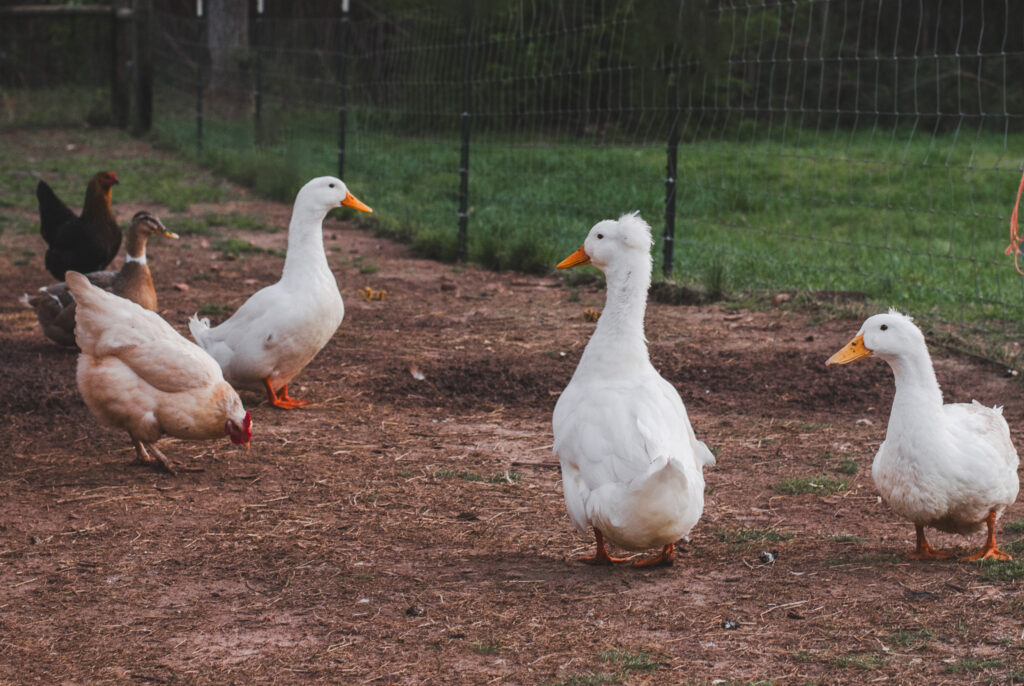
Benefits of Raising Ducks
Excellent Eggs
Ducks lay eggs like it’s their job (well, it kinda is!). Their eggs are bigger and have a richer taste compared to chicken eggs. Plus, they’re great for baking! A few of the best breeds of ducks for egg laying are White Crested, Khaki Campbell, and Indian Runner.
Pest Control Pros
Ducks naturally control pests. They love eating all sorts of bugs, like slugs, snails, and insects. They’re great for removing pests from your garden and they don’t tend to destroy plants like chickens do.
Fertilizer Factories
Duck poop might not sound glamorous, but it’s gold for your garden. Their droppings make great fertilizer for your soil and help your veggies grow big and strong.
Low Maintenance
Ducks are pretty easy to take care of. They don’t need fancy housing—just a secure coop to keep them safe from predators, some water to paddle around in, and regular feeding.
Drawbacks of Raising Ducks
They’re Messy
Ducks love water, and where there’s water, there’s mud. They can turn a pristine pond into a muddy mess pretty quickly, so be prepared for some cleanup duty. However, you can use their dirty pond water in your garden. It’s great for the soil.
Noisy Neighbors
Ducks aren’t exactly quiet. They can be very chatty, especially in the morning when they’re waiting for breakfast. If you’ve got close neighbors, they might not appreciate the early wake-up calls.
Water Woes
Ducks need water to thrive, whether it’s a pond, kiddie pool, or even just a large water trough. Keeping their water clean can be a bit of a chore, and they might make a mess splashing around.
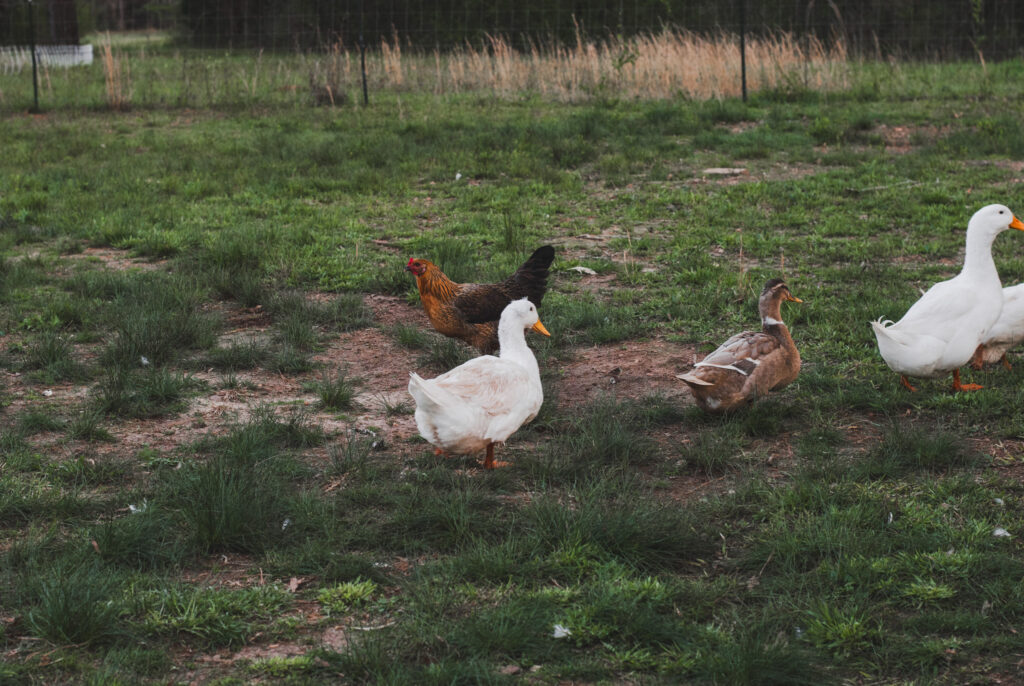
Helpful Tips for Raising Ducks
Start Small
If you’re new to duck keeping, start with just a few ducks to get the hang of things. They’re social animals, so they’ll appreciate having other friends around.
Secure Coop
Make sure your duck coop is predator-proof. Raccoons, foxes, and even neighborhood dogs might see your ducks as a tasty snack, so secure their home with sturdy fencing and locks.
Clean Water is Key
Ducks need clean water for drinking and bathing. Change their water regularly to keep it fresh and prevent any nasty bacteria from building up.
Watch Their Diet
Ducks will munch on just about anything, but that doesn’t mean they should. Make sure they have access to a balanced duck feed to keep them healthy and happy.
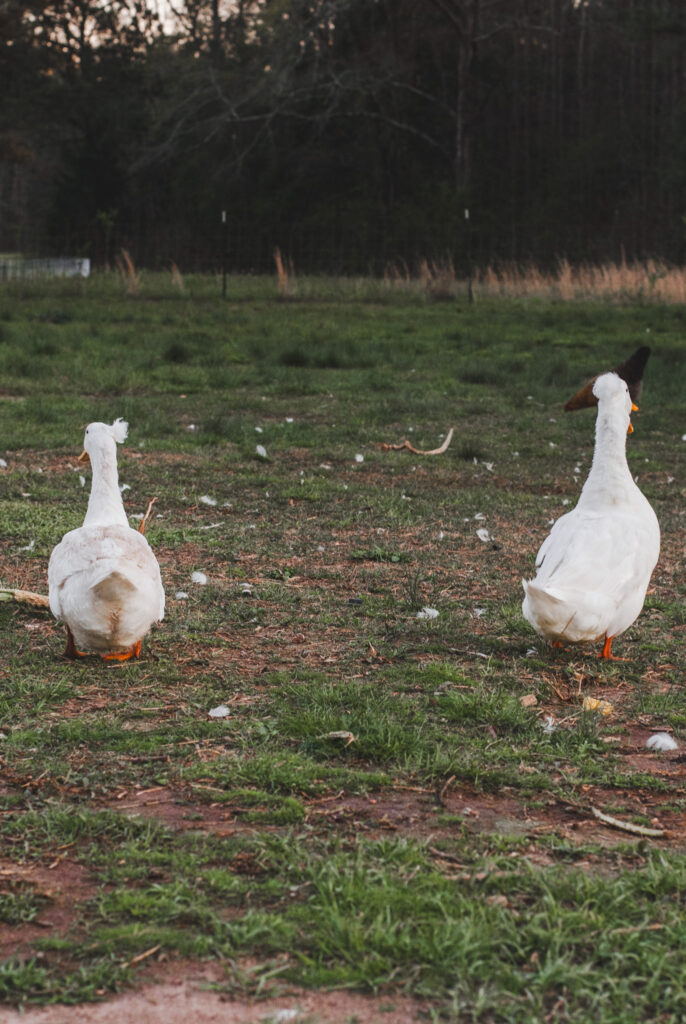
Raising Ducks with Chickens
Mixing ducks and chickens on your homestead can seem like a great idea, but there are some hazards you should be aware of:
Disease Transmission
Ducks and chickens can carry different diseases, some of which might not affect one species but could be harmful to the other. For example, ducks are more resistant to certain strains of avian influenza, but they can still carry and transmit them to chickens, causing illness or even death.
Size Disparity
Ducks are generally larger and more robust than chickens. This size difference can lead to bullying or accidental injuries, especially if there’s competition for food or space. Ducks might unintentionally trample smaller chickens or peck at them out of curiosity.
Dietary Differences
Ducks and chickens have slightly different dietary needs. While they can share some of the same food, ducks require more niacin and less salt than chickens. If they’re fed the same diet, chickens might not get enough niacin, leading to leg problems or other health issues.
Water Contamination
Ducks love water, while chickens like to keep their feet dry. If you provide water sources for both, there’s a risk of contamination from duck droppings. Dirty water can harbor bacteria and parasites that might make chickens sick.
Social Dynamics
Ducks and chickens have different social hierarchies and communication styles. Chickens establish pecking orders, while ducks rely more on body language and vocalizations. Mixing the two flocks can lead to conflicts as they try to establish dominance and territory.
To keep these hazards to a minimum consider:
- Separate Housing: Provide separate housing and feeding areas for ducks and chickens to reduce the risk of disease transmission and conflicts over resources.
- Clean Water: Ensure ducks have access to clean water for swimming and drinking, but keep their drinking water separate from the chickens’ water to prevent contamination.
- Monitor Behavior: Keep an eye on the interactions between ducks and chickens. If you notice any aggression or bullying, separate the individuals involved to prevent injuries.
By being mindful of these hazards and taking precautions, you can safely raise both ducks and chickens on your homestead while minimizing the risks to their health and well-being. Check out my previous post on raising ducks and chickens together.
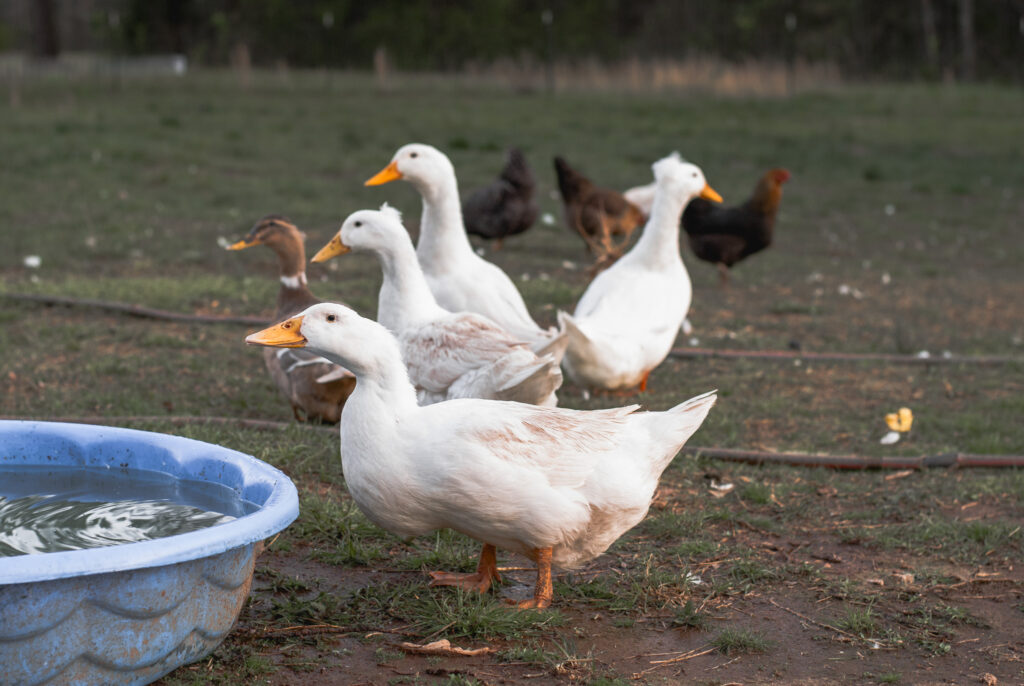
Duck Coop
Creating the perfect duck coop is all about providing a safe, comfortable, and functional space for your ducks to nest, and waddle about. Here’s what you should consider for an ideal duck coop:
- Ducks need plenty of space to move around, especially if they’ll be spending a lot of time cooped up. Aim for at least 4 square feet of floor space per duck. If they have access to an outdoor run during the day, you can get away with a slightly smaller indoor space.
- Ducks love water, so your coop should include a water source for drinking and bathing. This could be a shallow tub or trough that’s easy for them to access without drowning. Make sure it’s large enough for all your ducks to splash around comfortably.
- Ducks can be messy, and all that water and poop can create a damp environment that’s perfect for mold and bacteria. Good ventilation is essential to keep the air fresh and prevent respiratory problems. Consider adding windows, and vents to keep air circulating.
- Ducks are tasty treats for predators like foxes, raccoons, and owls. Make sure your coop is predator-proof with sturdy hardware cloth and locks on doors and windows. Digging predators might require burying wire mesh underground to prevent them from tunneling in.
- Ducks don’t roost like chickens do, but they still appreciate a comfortable place to rest. Provide some low platforms where they can perch off the ground. Nesting boxes aren’t as crucial for ducks as they are for chickens, but they might still appreciate a cozy spot to lay their eggs. Ducks love to bury their eggs in straw.
- Ducks are messy creatures, so your coop should be easy to clean and maintain. Consider using removable trays or linings under roosting areas to catch droppings, and use materials that are resistant to water and easy to scrub clean.
Remember to regularly inspect and maintain your duck coop to make sure it’s safe and comfortable. With a well-designed coop, your ducks will be happy, and healthy, and bring you lots of entertainment on the homestead.
FAQs
What do ducks eat?
Ducks enjoy a varied diet consisting of commercial duck feed, grains, vegetables, fruits, and insects. It’s essential to provide a balanced diet to ensure their health and productivity.
How much space do ducks need?
Ducks need a minimum of 4 square feet of indoor space per duck, with additional space for outdoor grazing and foraging. Providing ample room ensures they can move freely and exhibit natural behaviors.
Do ducks need water to swim in?
Ducks don’t necessarily need a large body of water to swim in, but they do require water deep enough to submerge their heads for drinking and to clean their feathers. A shallow pond, kiddie pool, or large water trough will suffice.
Do ducks need a heat lamp in winter?
Ducks are generally cold-hardy birds and can tolerate cold temperatures better than chickens. However, providing a heat lamp or heated water source can be beneficial during extreme cold snaps, especially for ducklings or breeds that are less cold-resistant.
Do I need a drake for my ducks to lay eggs?
No, ducks do not require a drake (male duck) to lay eggs. Hens (female ducks) will lay eggs regardless of whether there’s a drake present. However, if you want fertile eggs for hatching, you’ll need a drake for mating.
Can ducks live with chickens?
Ducks and chickens can coexist peacefully, but it’s essential to consider their differing needs and behaviors. Providing separate housing and ensuring adequate space, water, and food for both species can help prevent conflicts.
These answers should help address common concerns and provide guidance for those considering or already raising ducks on their homestead.
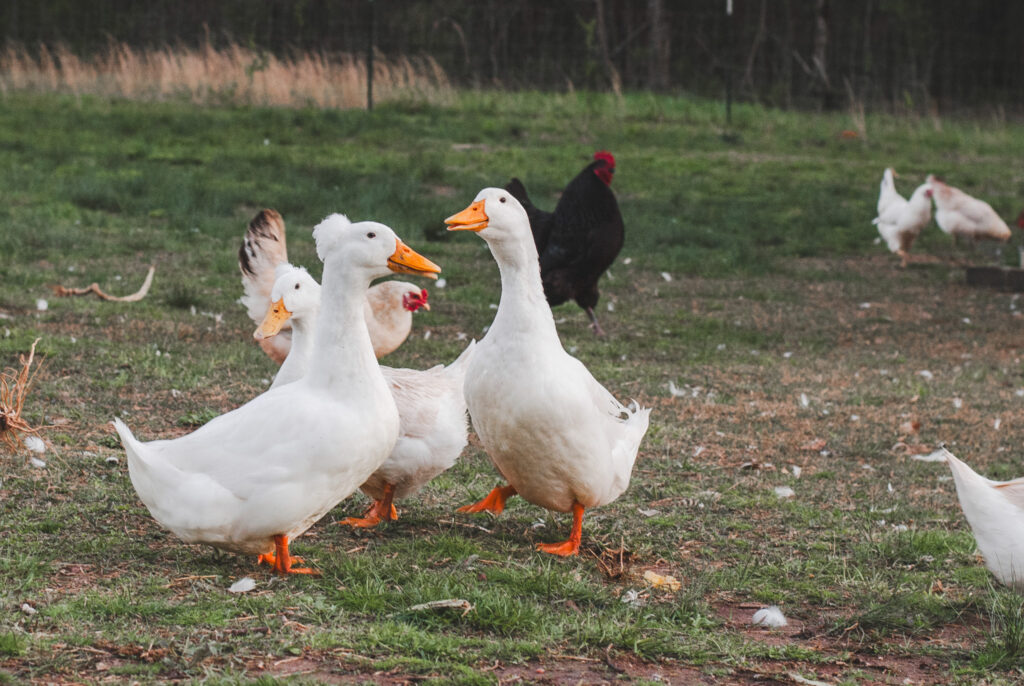
Final Thoughts On Raising Ducks
Raising ducks on the homestead can have plenty of benefits! Just be prepared for a bit of mess, some noisy mornings, and a whole lot of joy watching these guys waddle around your land.
If you enjoyed this duck article, please share it! Thanks for visiting my farm.
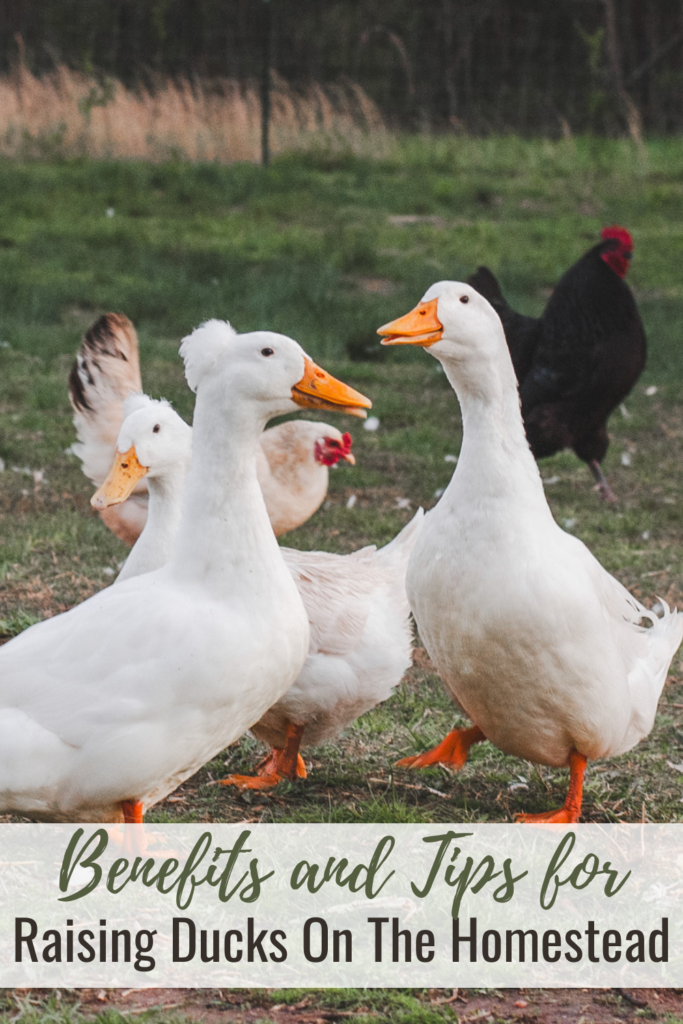
Leave a Reply